April 2023 Newsletter
Sad news of the death of Rev. Saidō
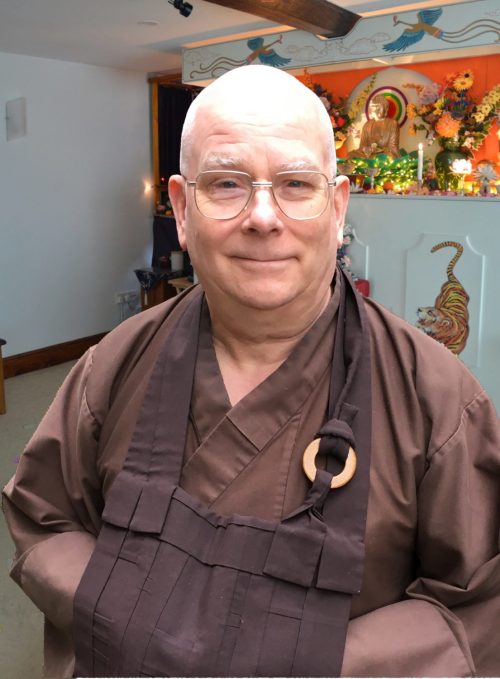
We were very sad to hear that Rev. Master Saidō, who was based at Telford Buddhist Priory in Shropshire, died on the 3rd of March, not long after having been diagnosed with pancreatic cancer. Rev. Saidō was a great friend to the temple, and his steady presence and wise council will be greatly missed.
Rev. Saidō’s funeral was held in Telford on Saturday the 18th of March, and the text of an “In Memoriam” article written by one of the senior monks of our order, Rev. Master Mokugen, is included below.
In Memoriam: Rev. Master Saidō Kennaway
With sadness we announce the death of Reverend Master Saidō Kennaway, a much-loved and deeply appreciated and respected member of the Order of Buddhist Contemplatives, and Prior of Telford Buddhist Priory. Reverend Master Saidō passed away on Friday 3rd March 2023 at the age of 72.
Deep sympathy is expressed to the wide circle of all his family and friends as well as to those in the monastic and lay Sangha. He will be greatly missed.
Reverend Master Saidō’s illness of pancreatic cancer progressed swiftly during his last few weeks, and he died after a one-night stay in Princess Royal Hospital, Telford. Rev. Kanshin Lucas and John Bamford were at his side. Many thanks are offered to all those who helped or sent many greetings and thoughts of love, gratitude, and support. Especial thanks are expressed to Karen Richards, Chris Hughes, John Bamford and all the members of Telford Buddhist Priory.
Reverend Master Saidō, who had made such a generous offering of his life and training for the good of so many, was grateful for, and touched by, for all the messages and prayers he received in the last weeks, even though unable to answer each individual as he clearly would have wished.
From his early years and Ordination in 1977, through the profound and crucial years of training at Shasta Abbey with the core group of monks invited from the U.K by Reverend Master Jiyu-Kennett, and onwards during the years after returning to develop Throssel Hole Buddhist Abbey as a centre of monastic and lay training, Reverend Master Saidō’s contribution has been immeasurable, and his dedication, depth of teaching and generosity in helping all, truly exemplary and inspirational. It is a tribute to Reverend Master Saidō that so many considered him their teacher, guide, supporter and close friend.
He became Prior of Telford Buddhist Priory in 2000. There he continued to be a refuge and teacher for many, and yet encouraged each in their full ability to realise the truth and to participate fully in the ongoing life and running of the Priory.
Most people would not even know of the many branches to which Reverend Master Saidō extended his Dharma help and practical expertise, through being a Trustee or Advisor to many charities and groups both within and beyond the Order. From his deep commitment to Angulimala, the prison chaplaincy service, to being available as an Advisor and friend to all the Order temples, priories, and meditation groups in Europe … the list was long and went on! His experienced support and contribution was always useful, often pivotal, and greatly appreciated.
Reverend Master Saidō had a deep and profound Faith, and the help he extended was based on a deep understanding of the Dharma. He was always down-to-earth, practical, unassuming and had a wonderful sense of humour which always kept those around him with a smile on their face and not infrequently in stitches! He had a genuine interest in everyone he met and showed great generosity of spirit in showing appreciation, championing various skills, and listening to all with genuine interest and attention.
Going forward many will better express his contribution and their gratitude for his life and legacy. As one of his many friends, I will add my name to all those who say an enormous “Thank you!”, with love and a deep bow from the heart.
Reverend Master Saidō, the legacy of your profound yet unassuming, kind, and wise heart will live on, and leave its imprint in this world!
Rev. Master Mokugen Kublicki
***
Rev. Master Saidō, born David Kennaway 14 Mar. 1950, Cheadle Hulme, Cheshire; died 3 Mar. 2023, Telford, Shropshire.
A science graduate, before entering monastic life he worked in the field of water treatment and purification.
In addition to the roles quoted above, he was First Prior of Reading Buddhist Priory 1990-1991; sometime vice-abbot of Throssel Hole; OBC European Advisor 1997-2023; trustee of Throssel Hole Buddhist Abbey, The Network of Buddhist Organisations, Norwich Zen Buddhist Priory, Rochdale Zen Retreat, Dharmazuflucht Schwarzwald, The Place of Peace Dharma House, and The Order of Buddhist Contemplatives Activities Trust. He was also Spiritual Supporter to Morning Star Sangha Trust and Monastic Advisor to Archbishop Rowan Williams Hermitage Trust.
Rev. Saidō’s Funeral
Rev. Saidō’s funeral was held at Telford Crematorium on Saturday the 18th of March. There were about one hundred people in attendance, including monks of the OBC, monastics from other Buddhist traditions, and lay Sangha members from around the country. There were also several Prison Chaplains from the different prisons that Rev. Saidō visited, as well as representatives of the Network of Buddhist Organisations (NBO).
The picture below is from the livestream of the ceremony, in which Rev. Saidō’s coffin is central on the catafalque and Rev. Master Mugō, the celebrant, is standing at the lectern on the left-hand side. Most of those who attended the funeral are out of view in the left-hand portion of the seating, which was set further back than the right-hand side.
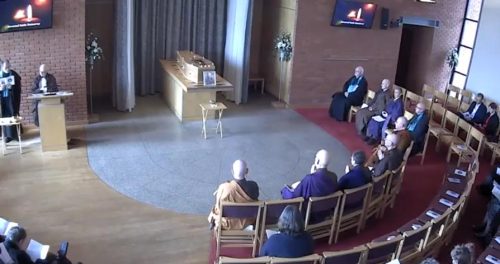
The funeral was an opportunity for us to express our gratitude for Rev. Saidō’s life of training, and we recited The Names of the Ten Buddhas, The Scripture of Great Wisdom and The Litany of the Great Compassionate One, out of gratitude for his great compassion.
Following the funeral ceremony a reception was held at Park House Hotel in nearby Shifnal, and the photograph below gives a sense of the scale of the occasion, and the number of people in attendance.
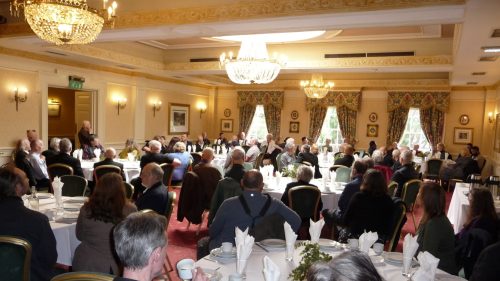
Rev. Saidō’s death leaves a large hole in our order, as well as in many other organisations, and we offer the merit of this newsletter and of our practice to Rev. Saidō, out of gratitude for his great compassion.
Induction of the new Abbot at Throssel Hole
The Induction Ceremonies for the new Abbot of Throssel Hole Buddhist Abbey, Rev. Master Berwyn took place on Saturday the 25th of March. Rev. Aiden travelled up to Northumberland to join the monastic community for the ceremonies, and there were nearly 50 lay guests there for the day, some of whom had stayed overnight at the abbey.
Fortunately the weather was kind to us for the outdoor portion of the ceremony, where we processed up from the bottom road and the new abbot offered incense and made a dedication at the entrance to the courtyard by the Meditation Hall and Abbot’s House. The photo below shows the procession up the lane, with Rev. Master Berwyn at the front carrying a staff and fountain sceptre.
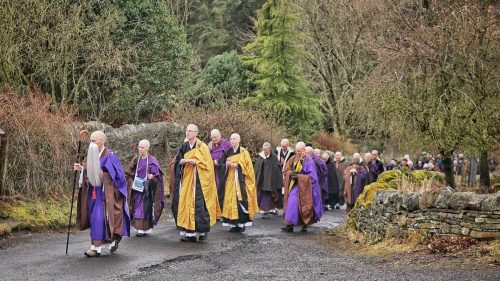
After the incense offering and dedication the procession carried on to the Ceremony Hall, and the photo below shows the monastic community and guests assembled in the hall as the new abbot offers incense.
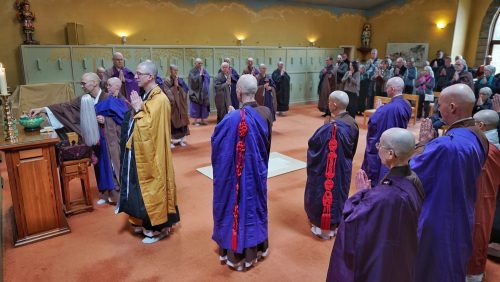
Shortly after the Induction Ceremony a second ceremony was held, which is known as the Abbot’s Dharma Ceremony. During this ceremony the abbot stands on a raised plinth in front of the main altar, holding a ceremonial ‘Sword of Buddha’s Wisdom’, and each of the monks goes up in turn and asks the abbot a question. The photo below was taken as one of the monks was standing in front of the abbot asking their question.
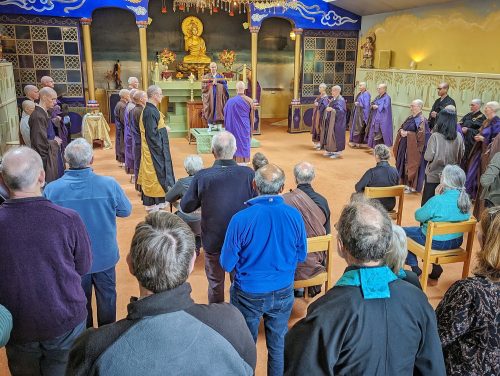
The last Induction Ceremony for a new abbot at Throssel was in March 2019, when Rev. Master Leandra became the abbot, and the one before that was in 1982, when Rev. Master Daishin became the abbot. The installation of a new abbot is a major event in the life of the monastic community, and will also have an impact on the OBC Lay Sangha throughout the country. We offer our gratitude to Rev. Master Berwyn for being willing to take on this important role, and wish him well in his future training as the abbot of Throssel Hole Buddhist Abbey.
Forthcoming Events:
The Festival of Manjusri Bodhisattva
On Saturday the 1st of April we will be celebrating the Festival of Manjusri Bodhisattva. Manjusri is the Bodhisattva of Wisdom, usually portrayed holding the Sword of Wisdom that cuts through delusion, and riding “the Beast of Self which never sleeps”. Are we Manjusri or are we the beast? It may seem like we are divided between a good side and a bad side, between clarity and confusion, but we gradually come to see that Manjusri and the beast are not two different things.
When we come to understand the true nature of “self”, we see that the “beast” is what carries and supports Manjusri – and us. The wisdom which Manjusri embodies is not intellectual or conceptual wisdom, but the ability to see ourselves and the whole of existence with clarity. When we see clearly, we understand that we must act in the world in a way that is rooted in compassion for all beings.
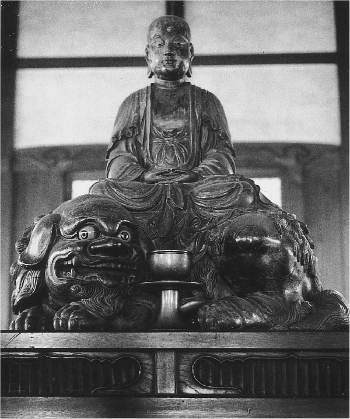
In addition to welcoming visitors to the temple for the festival (please book in advance), we will also be holding the festival over zoom so that Lay Sangha members can join in from where they are. Full details of the festival day will be sent out by email to Lay Sangha members prior to the festival.
This festival day will run from 10am to 4pm, with the Festival and Dharma Talk both in the morning so that people can come just for those if they would prefer. There will then be the option to stay on for a bring-and-share lunch and an afternoon of meditation, followed by tea and biscuits and an opportunity to ask questions.
Buddhist Stories
There are many stories in Buddhism, from the time of the Buddha onwards, and they are very helpful in illustrating aspects of the Buddha’s teaching and Buddhist practice.
A Bucketful of River
An allegory for Buddhist training
There is an ancient story which tells of someone living in a very dry dusty country, who feels the call to make a journey, without being entirely sure why. The Seeker, as this person is called, has some sense of which direction to go in, but there is no one to point the way, no map to consult, and there are no roads or even tracks to follow.
The inner call to leave the familiar surroundings of the home village becomes stronger and stronger, and the Seeker eventually sets out, because not to do so is no longer a satisfactory option. Leaving the landscape of life-so-far, the Seeker heads in the direction that seems to be necessary. Travelling by day and resting by night, the journey continues on and on. As the days become months, with no end in sight and the beginning almost forgotten, life becomes the travelling, and the travelling becomes life.
Sometimes uncertain, but continuing on anyway, from day to day the Seeker doesn’t notice the gradual change in the landscape and climate. Then at times there is the sudden recognition that it is different here; different from the dusty country which was left behind.
After what seems like a lifetime of travelling, it is not entirely the same person, but nor is it a completely different person, who one day stumbles upon something never experienced before. Although the journey to get here has been long and gradual, the sight of what is now encountered is difficult to take in. Those who dwell here say that it is called the Great River. The Seeker tentatively dips a finger into this unknown thing, then a foot, and as it becomes more familiar, eventually plunges in and swims freely in the water. Feeling the unexpected flow of the river, sometimes the Seeker swims upstream against the current, and sometimes drifts downstream carried by the current. Occasionally the Seeker swims right out into the river, so that the far bank can be seen in the distance, and then turns back.
After some time, the Seeker feels a call to return to the dry and dusty country, and to share with the people there the wonders of the Great River; its immense size and its swiftly flowing current. Realising how hard it will be to convey the life of the Great River to those who have never seen it, the Seeker decides that the only way will be to take the river back, so that people can know it for themselves.
Finding a bucket, the Seeker scoops up some water from the swiftest flowing part of the river and sets out on the journey back to the dusty country.
The journey back never seems as long as the journey there, and sooner than expected the Seeker comes upon the village and goes to the home of a Good Friend, and tells of the Great River and shows the Good Friend the bucket of water. Unprepared for the revelation, the Good Friend is astounded to see what the Seeker has brought. The Good Friend tentatively dips a finger into this unknown thing, and as it becomes more familiar, eventually plunges a whole arm in and turns it freely in the water. As the water moves, it reminds the Seeker of how it feels to swim with the current of the river. The Good Friend asks to keep some of the river, and when the Seeker agrees, fills a bowl with a portion of the water.
When the Seeker has left, the Good Friend goes to a Relative, and tells of the Great River and shows the Relative the bowl of water. Unprepared for the revelation, the Relative is astounded to see what the Good Friend has brought. The Relative tentatively dips a finger into this unknown thing, and as it becomes more familiar, eventually plunges a whole hand in and turns it freely in the water. As the water moves, it reminds the Good Friend of how it feels to turn a whole arm in the water. The Relative asks to keep some of the river, and when the Good Friend agrees, fills a cup with a portion of the water.
When the Good Friend has left, the Relative goes to a Neighbour, and tells of the Great River and shows the Neighbour the cup of water. Unprepared for the revelation, the Neighbour is astounded to see what the Relative has brought. The Neighbour tentatively dips a finger-tip into this unknown thing, and as it becomes more familiar, eventually plunges a whole finger in and turns it freely in the water. As the water moves, it reminds the Relative of how it feels to turn a whole hand in the water. The Neighbour asks to keep some of the river, and when the Relative agrees, fills a thimble with a portion of the water.
When the Relative has left, a Young Child comes to visit the Neighbour, who tells of the Great River and shows the Young Child the thimble of water. Unprepared for the revelation, the Young Child is astounded to see what the Neighbour has shown. The Young Child tentatively dips a finger-tip into this unknown thing, and as it becomes more familiar, eventually turns the finger-tip freely in the water. As the water moves, it reminds the Neighbour of how it feels to turn a whole finger in the water. The Young Child wants to share this amazing experience with everyone, and asks to borrow the Great River. The Neighbour agrees, and the Young Child carries the thimble of water from house to house, so that everyone can know how it feels to experience the Great River.
Everyone who experiences the Great River in the thimble is amazed by it, and inspired by the enthusiasm of the Young Child, follow from door to door as the Great River is carried throughout the village.
Eventually they come to the home of the Relative, and the Young Child tells of the Great River and shows the Relative the thimble of water. The Relative laughs, and brings out the cup of water, saying that this is the true Great River, and that what is in the thimble is just a portion of it. Their understanding of the nature of the Great River deepens, and borrowing the cup of water from the Relative they continue around the village.
Eventually they come to the home of the Good Friend, and the Young Child tells of the Great River and shows the Good Friend the cup of water. The Good Friend laughs, and brings out the bowl of water, saying that this is the true Great River, and that what is in the cup is just a portion of it. Their understanding of the nature of the Great River deepens, and borrowing the bowl of water from the Good Friend they continue around the village.
As they continue on their way they happen to meet the Seeker, and the Young Child tells of the Great River and shows the Seeker the bowl of water. The Seeker laughs, and shows them the bucket of water, saying that this is the true Great River, and that what is in the bowl is just a portion of it. Their understanding of the nature of the Great River deepens, and they follow the Seeker, who carries the Great River itself.
As time passes, people ask the Seeker about the Great River, and the Seeker describes the journey, and what it is like to swim in the Great River. Turning a whole arm in the bucketful of River, the Seeker relives the experience of swimming, and when others turn their arm in the bucket they believe that they do too.
The Young Child, however, realises that the bucket is itself just a portion of the Great River, and asks the Seeker for directions to find the true source. The Seeker describes the path and the journey, and the Young Child sets out, but after a while becomes lost in an inhospitable wilderness. Unable to follow the Seeker’s directions any more, the Young Child sits down and accepts that the way is lost. After a while, however, the need to move on is strong, and the Young Child sets off in a direction that seems good to follow, with no expectation of finding the Great River. Before too long the Young Child reaches something never experienced before, and from the Seeker’s description realises that it is the Great River.
The Young Child tentatively dips a finger into this unknown thing, then a foot, and as it becomes more familiar, eventually plunges in and swims freely in the water. Feeling the flow of the river, the Young Child understands, through direct experience, what the Seeker was trying to describe.
Returning to the dusty country, the Young Child talks about the Great River in words very different to those of the Seeker. The Seeker recognises from experience that the description is of just the same Great River swum in by the Seeker long ago. Those who have not known it for themselves, however, are confused, and setting the two descriptions against each other, form rival groups. Although both the Seeker and the Young Child know that both descriptions are accurate, the Seeker encourages people to support just the one viewpoint, that of the Seeker, whereas the Young Child points out the folly of setting up two different groups.
Those who support the Seeker make rich offerings, and the Seeker encourages this, saying that this is the best way for them to gain merit, so that they too may, at some point in the future, experience the Great River. When those who support the Young Child make offerings, the Young Child child does accept them, but encourages them to set out to find the Great River, and to know it for themselves.
In the short term, the Seeker’s group becomes very wealthy and has ornate altars, but when the Seeker dies, there is no one who can talk of the Great River from their own experience, and the group quickly disbands.
The Young Child’s group is supported, but not wealthy. However it has many members who have themselves swum in the Great River, and felt its currents. When the Young Child dies there are others who can guide people towards the Great River, and it is this lineage that has come down to the present time.
Alms Bowl Requests
Donations of Food
Offering food is a traditional way to support a monk, and all donations of vegetarian food are most welcome. In particular:
- porridge oats
- peanuts or other nuts
- peanut butter
- fresh fruit and vegetables (except garlic or peppers)
- dried herbs
- cheese, eggs and yoghurt
Any other suitable items would also be appreciated.
Donations
The temple is dependent on donations for its continued existence, and any financial support you are able to offer is greatly appreciated. Details of how to offer support can be found on the Donations page of the website.
All donations are received with gratitude


